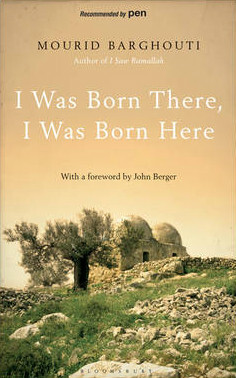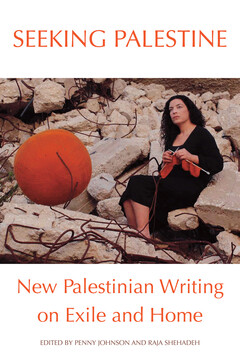The Electronic Intifada 19 April 2012

I Was Born There may have converted me to the Barghouti camp, helped by Humphrey Davies’ fluid, lyrical translation. It picks up where I Saw Ramallah left off, in the later part of the ill-fated Oslo period.
Where that tale took Mourid Barghouti to his birthplace of Deir Ghassaneh, north of Ramallah, the second volume recounts the visit of Mourid’s son Tamim, also a poet as well as a political scientist, to the same village.
“I was born here,” Mourid can finally say to his son (79). Not the “I was born there” of exile, but the “here” of aunts, uncles, hitherto-unmet friends who know everything about your life, and the village houses, school, trees and mosque which have left their imprint upon generations of the same family, now dispersed across the globe.
Dark humor
Telling Tamim’s tale allows Barghouti to look at Palestine through different eyes. He recounts, as if seeing for the first time, not only the beauty of the landscape and the incredible excitement of a young Palestinian sneaking through Qalandiya checkpoint into Jerusalem, but also the cumulative pettiness, indignities and uncertainties to which any diaspora Palestinian visiting his own land is subject.
Through a combination of memoir, everyday observation, and occasional riffs on subjects ranging from coffee or olive oil to the evils of dictatorship, Barghouti delivers an eclectic, beautifully-paced book.
On one hand, we encounter the dark humor with which Palestinians stare down their oppression. A taxi passenger observes, on the eve of an Israeli invasion: “As if the film needed more action! Every day they kill us retail and once in a while they get the urge to kill us wholesale.”
Meanwhile his fellow travellers tell each other notorious jokes about the residents of Hebron — “Are you Khalili (“from Hebron”), Mahmoud my friend?” and the response: “ ‘I used to be but I got treatment.”
The banter is shared during a surreal, only-in-Palestine moment as their shared taxi is hoisted by crane over a fog-enshrouded Israeli trench cutting the road between Ramallah and Jericho.
Decades earlier, Barghouti’s mother jokes that “It’ll have to be school for you, my boys, that’s for sure. You’ll die of hunger if you ever have to work with your hands” (15).
Raw anger
On the other hand, Barghouti spares us none of his raw anger at the corruption of the Palestinian Authority and the complicity of Arab regimes whose motto, he claims, is “from the Atlantic to the Gulf: ‘We love Palestine and hate the Palestinians’” (15).
Readers of I Saw Ramallah will be aware that Barghouti spent much of his life exiled from both Palestine and his adopted home of Egypt, deported by the Egyptians for his political views. The experience of being separated from his son and his wife, the novelist Radwa Ashour, has left deep scars. These are witnessed in a recurrent theme: Barghouti’s inability to protect and comfort his loved ones at important moments — operations, deportations, humiliating border crossings — and in comments such as:
“If an Arab ruler wishes to arrest me, he will without doubt arrest me. If a policeman wants to kick me in the stomach and liver, he will without doubt kick me. If an esteemed ‘sovereign’ Arab sister-state wishes to exercise its ‘sovereignty’ against my thin body or my innocuous words in order to kick me out with its imported shoes, it will kick me out” (201).
…or in bitter excoriations of Arab intellectuals who have “fought long and hard in defense of their inalienable right to possess a flexible spine that enables them to bow … before the chamberlain of the dictator’s palace” (25).
The generation of Palestinian Authority apparatchiks whose self-interest and collusion with Israel Barghouti despises are represented at key points by a shadowy figure known as Namiq al-Tijani who brings to mind “mollusks and mucosities.” Running throughout the book is a howl of rage and frustration, not at big political questions, but over the frustrations and humiliation to which the Palestinian people are daily subjected, whether in the occupied West Bank and Gaza Strip or in the diaspora.
Passionate yet disciplined prose
But despite his sarcasm and palpable fury, Barghouti’s take on his fellow Palestinians remains deeply humanistic. He rages at the the Oslo negotiators “whose sole talent lay in being talentless” (38) and the “bearers of the keys to the treasury” who forget the widows and orphans they publicly pledge to support (40).
But he is able to paint a poignant portrait of Yasser Arafat, ailing in his Muqataa (presidential compound) in 2002, humiliated and trapped but refusing to leave. Receiving a group of international writers, including the Nobel prizewinner José Saramago, Arafat rummages in a cupboard to find plastic “Bethlehem 2000” badges, the only souvenir he can bestow. Barghouti is frank about the “cooked” elections, but concludes that Arafat’s mistakes were “those of a victim, not of a criminal” (149).
If you already know your stuff on contemporary Palestine — from the Oslo period through the second intifada and the current bitter limbo — simply sit back and appreciate Barghouti’s clean, passionate-yet-disciplined prose. But like, for example, the dark comedy of Suad Amiry’s Sharon & My Mother-In-Law, Barghouti’s latest work is much more than confirmation for the converted.
Buy this book for anyone in your life who needs to understand the pain, the absurdity, the injustice, and the devastatingly predictable unpredictability of life for ordinary Palestinians. And buy it for those you want to remind that the Palestinian cause is ultimately about human beings, flawed and beautiful like any others, but forced by Zionism and colonialism and international disdain to be patient and resilient beyond belief.
Sarah Irving is a freelance writer. She worked with the International Solidarity Movement in the occupied West Bank in 2001-02 and with Olive Co-op, promoting fair trade Palestinian products and solidarity visits, in 2004-06. She is the author of the Bradt Guide to Palestine and co-author, with Sharyn Lock, of Gaza: Beneath the Bombs. Her biography of Leila Khaled will be published in May 2012.






Comments
Well-written...
Permalink Salah AbuEin replied on
I would like to thank you for taking the effort to summarize this memoirs, also thanks for the true & talented paragraph you wrote at the end.
Salah - thank you for your
Permalink Sarah Irving replied on
Salah - thank you for your kind words. Glad you enjoyed the article.